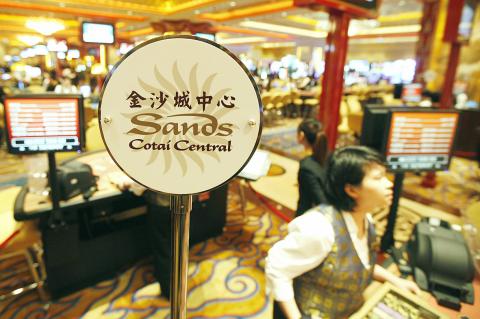The Chinese arm of US billionaire Sheldon Adelson’s gambling empire is being investigated by Macau privacy authorities over its handling of documents related to a lawsuit by its former CEO, who claims the company has links to crime bosses and encourages prostitution as part of its business strategy.
Sands China Ltd said yesterday it was notified by Macau’s privacy watchdog that an official investigation has been launched into the alleged transfer of “certain data” from the Asian gambling city to the US.
The former CEO, Steve Jacobs, was fired in July 2010 and filed a wrongful dismissal lawsuit three months later. He accuses the company of breach of contract and pushing him into illegal activity in Macau. The suit has drawn interest from US Justice Department and Securities and Exchange Commission investigators for possible violation of the Foreign Corrupt Practices Act.

Photo: Reuters
Sands China revealed no other details about the privacy investigation. The probe follows statements by Jacobs in US legal filings that Las Vegas Sands Corp, which is the parent company of Sands China, withheld documents related to his wrongful dismissal lawsuit.
Jacobs’ legal team has been seeking the documents from Las Vegas Sands, which the company’s lawyers initially said could not be moved out of Macau. However, they revealed recently that the files had been transferred in error more than a year ago, without notifying Macau or US authorities.
Macau has stringent privacy regulations that require consent and notification of authorities before personal data can be transmitted out of the territory.
A judge in the US has scheduled hearings for Aug. 30 and 31 on possible sanctions against Sands and its lawyers for failure to disclose the information to the other side.
Macau is the world’s biggest gambling market, raking in US$33.5 billion in casino revenue last year. Sands also operates casinos in Singapore as well as the Venetian and Palazzo casinos on the Las Vegas Strip, but its four Macau casinos account for the bulk of the company’s revenue.

COMPETITION: AMD, Intel and Qualcomm are unveiling new laptop and desktop parts in Las Vegas, arguing their technologies provide the best performance for AI workloads Advanced Micro Devices Inc (AMD), the second-biggest maker of computer processors, said its chips are to be used by Dell Technologies Inc for the first time in PCs sold to businesses. The chipmaker unveiled new processors it says would make AMD-based PCs the best at running artificial intelligence (AI) software. Dell has decided to use the chips in some of its computers aimed at business customers, AMD executives said at CES in Las Vegas on Monday. Dell’s embrace of AMD for corporate PCs — it already uses the chipmaker for consumer devices — is another blow for Intel Corp as the company

ADVANCED: Previously, Taiwanese chip companies were restricted from building overseas fabs with technology less than two generations behind domestic factories Taiwan Semiconductor Manufacturing Co (TSMC, 台積電), a major chip supplier to Nvidia Corp, would no longer be restricted from investing in next-generation 2-nanometer chip production in the US, the Ministry of Economic Affairs said yesterday. However, the ministry added that the world’s biggest contract chipmaker would not be making any reckless decisions, given the weight of its up to US$30 billion investment. To safeguard Taiwan’s chip technology advantages, the government has barred local chipmakers from making chips using more advanced technologies at their overseas factories, in China particularly. Chipmakers were previously only allowed to produce chips using less advanced technologies, specifically

MediaTek Inc (聯發科) yesterday said it is teaming up with Nvidia Corp to develop a new chip for artificial intelligence (AI) supercomputers that uses architecture licensed from Arm Holdings PLC. The new product is targeting AI researchers, data scientists and students rather than the mass PC market, the company said. The announcement comes as MediaTek makes efforts to add AI capabilities to its Dimensity chips for smartphones and tablets, Genio family for the Internet of Things devices, Pentonic series of smart TVs, Kompanio line of Arm-based Chromebooks, along with the Dimensity auto platform for vehicles. MeidaTek, the world’s largest chip designer for smartphones

TECH PULL: Electronics heavyweights also attracted strong buying ahead of the CES, analysts said. Meanwhile, Asian markets were mixed amid Trump’s incoming presidency Taiwan Semiconductor Manufacturing Co (TSMC, 台積電) shares yesterday closed at a new high in the wake of a rally among tech stocks on Wall Street on Friday, moving the TAIEX sharply higher by more than 600 points. TSMC, the most heavily weighted stock in the TAIEX, rose 4.65 percent to close at a new high of NT$1,125, boosting its market value to NT$29.17 trillion (US$888 billion) and contributing about 400 points to the TAIEX’s rise. The TAIEX ended up 639.41 points, or 2.79 percent, at 23,547.71. Turnover totaled NT$406.478 billion, Taiwan Stock Exchange data showed. The surge in TSMC follows a positive performance